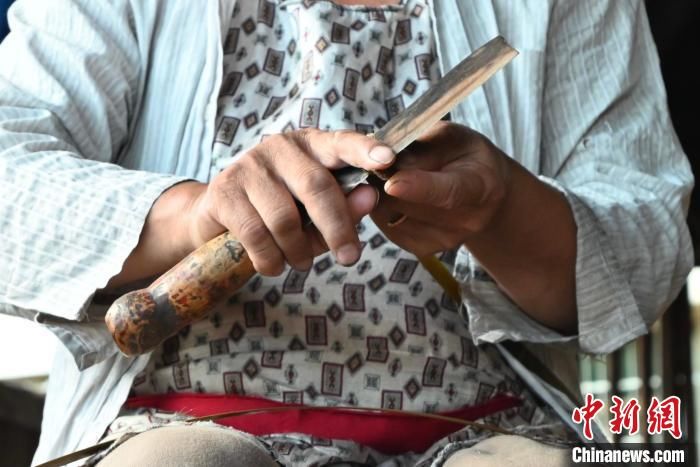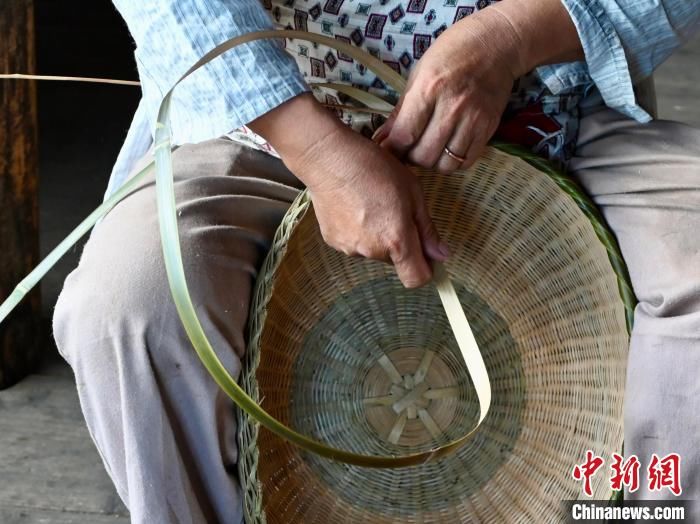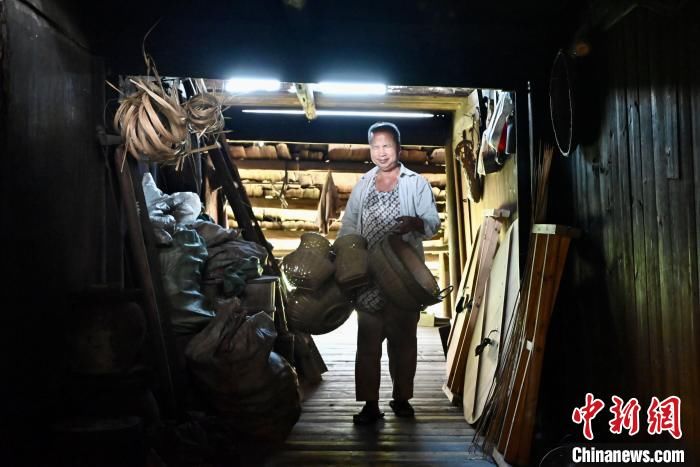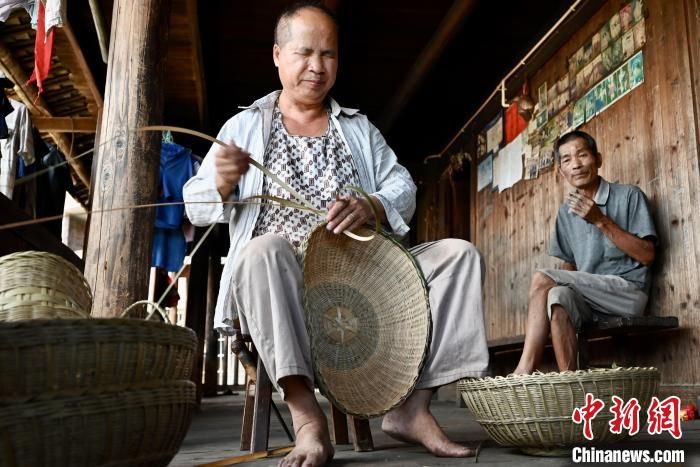
Wu Lao Cai is using a knife to trim bamboo strips. Photo by Hou Yunying
China News Service, Liuzhou, July 15th, title: Guangxi blind bamboo weaving craftsman: once walked 60 kilometers into the village to weave every stone along the way by memorizing it by heart
Author Liu Juncong
On July 15, Wu Laocai, leaning on a slender bamboo pole and wearing a shirt that was washed and wrinkled, returned home along the undulating path in the village. This is one of the few remaining Dong stilted buildings in the village. one. He stepped onto the palm-width wooden steps calmly, and no one could notice that he was a blind man who had been blind for a long time.
Wu Laocai, 60 years old this year, lives in Meizhaitun, Sunjiang Village, Liangkou Township, Sanjiang Dong Autonomous County, Liuzhou City, Guangxi. He is a well-known blind bamboo craftsman in the area. Due to illness, Wu Laocai lost his “light” since he was two years old. In order to make a living, he began to learn bamboo weaving skills from his master at the age of 18.

Wu Lao Cai is interspersing bamboo strips. Photo by Hou Yunying
“It was very difficult to learn at the beginning. I dismantled all the bamboo weaving products in my home, and used my hands to feel the weaving methods and structures of different bamboo weaving products. Then I slowly studied it through the hands-on guidance of the master and family members.” Wu Said the old man.
During the conversation, I saw him pinching and pulling his hands dexterously, and the slender bamboo sticks were accurately inserted into the holes only the size of a fingernail. In just two hours, a small exquisite bamboo work was manufacture complete. In the life of bamboo weaving for decades, Wu Laocai’s bamboo weaving skills are quite skilled. From cutting the bamboo to the final bamboo weaving, he completes the entire process independently.

Wu Lao Cai is sorting out the bamboo baskets that have been woven. Photo by Hou Yunying
The quality of bamboo has a decisive influence on the quality of bamboo weaving. The bamboo forests behind the mountain are the “treasure places” of Wu Laocai. Whenever there was a shortage of materials, Wu Laocai would go up the mountain with a machete to cut bamboo. He repeatedly rubbed the bamboo noodles with his right hand, and then he lifted the knife and dropped a bamboo with a thick bowl on his shoulders and took him home. .
“I can only choose bamboos by touching them. Bamboos with smooth surfaces are not easy to cut, so I don’t choose them. Bamboos with ‘sticky’ surfaces are easier to handle and are the best choice.” Wu Laocai said.
In Guangxi, bamboo woven products are essential items, and various bamboo woven products can be used to protect against wind and rain, bring meals, and even “pretend” children. As his fame spread, Wu Laocai began to walk out of the house and was invited to help weaving bamboo utensils in various villages. A bamboo pole used to guide the way became his most faithful companion on the journey.

Wu Lao Cai is weaving bamboo. Photo by Hou Yunying
In the early years, the transportation was inconvenient, and Wu Laocai had to walk all day across the mountains and mountains to reach the territory of Guizhou Province, which is 60 kilometers away. He memorized every pass, every curve, and even every stone along the way. In the eyes of his younger brother Wu Fortune, this is completely unbelievable.
“Now when we are in the car together, he can always tell us in detail the specific location of each village and mountain col. It is hard to imagine that he has figured it out one by one. In the eyes of others, he has always been A warm-hearted person, no matter how far he is invited, he will go.” Wu Caifu said.
Today, Wu Laocai has become a well-known local bamboo craftsman and is widely recognized by everyone. For most of the year, Wu Laocai goes out to help villages weave bamboo utensils and sells them at a price of 15 yuan each, which brings him enough income to make a living.
“Last year, I helped more than 300 households weave bamboo wares. This is everyone’s affirmation of my skills. As long as I can walk, I will continue to weave.” Wu Laocai said. (End)